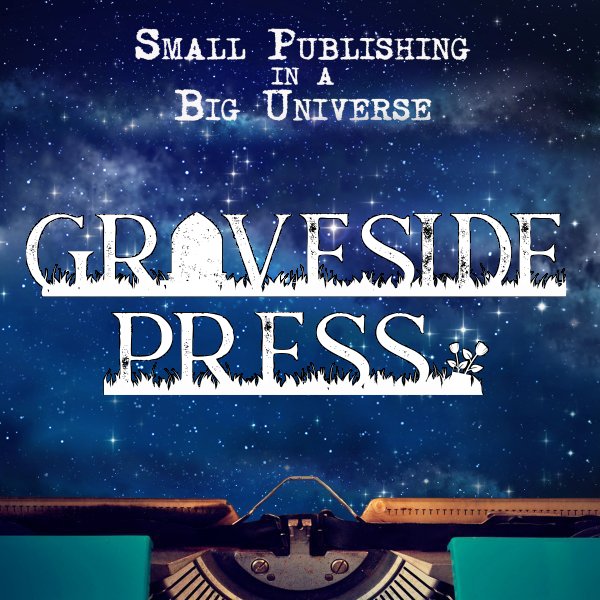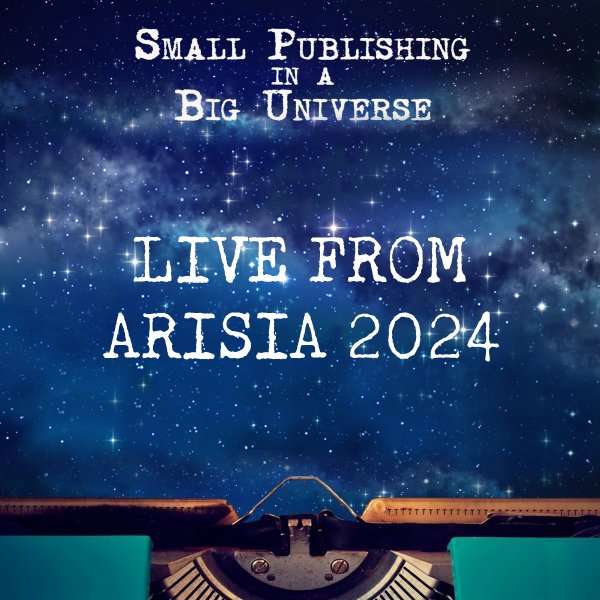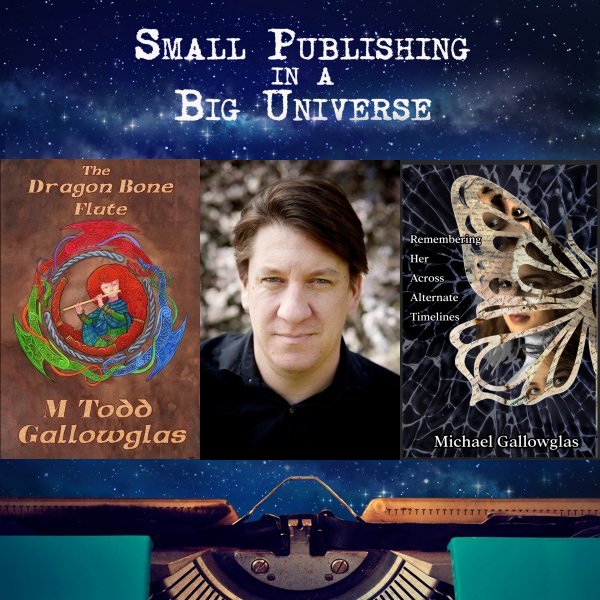Episode Transcript
[00:00:08] Speaker A: Hello and welcome to small publishing in a big universe. I am your host, Lisa Jacob. This month we have an interview with author Palmer Pickering, a prolific author with a new novel. We talk about her different novels and how she switches genres. But first, from our sponsors this month, Water Dragon Publishing has strained Sigma bonds by Arecibo Campeche. Dragon Gems has the short story flawless by J. Scott Coatsworth and a new anthology, Dragon Gems Spring 2024, which has humorous stories of speculative fiction from paper Angel Press is Sea of betrayal by Mitchell Sam Rossi and unruly voices has playing with a book of poetry by Lisa Jacob.
Strained sigma Bonds by Arecibo Campeche. This collection of stories are about magic, the tarot, haitian voodoo, and addiction. These stories are about people trying to control their environment, their sense of self, and even the smallest of things within their power and failing. Strange Sigma Bonds by Arecibo Campeche is available from Water Dragon Publishing in hardcover, paperback, and ebook editions. For more information, go to waterdragonpublishing.com.
Strained Sigma Bonds.
[00:01:46] Speaker B: Welcome to small publishing in a big universe. I have with us today Almer Pickering, and she has a book coming out. The first question is, what is your most recent book about?
[00:01:57] Speaker C: My most recent book is Darktown. It's lit rpg fantasy, which is about a tavern wench who goes down into an underground labyrinth to play the dragon's game.
[00:02:06] Speaker B: Why did you write this particular book? I know you've written other science fiction and fantasy books. Why did you write this particular rpg?
[00:02:17] Speaker C: I like challenges. I like to work my craft and write in different genres, and I like video games. And a friend of mine introduced me to the genre and I'd never heard of it. And I like video games. I write fantasy. I can do that. So I just wrote it in two months on a lark for fun over last year's holiday break. And it's just really low stakes. I had just finished reading legends and lattes, and the tone of it I really liked. It's considered cozy because it's low stakes, doesn't really have much violence, and so I really like that tone. And I wanted to do something lighthearted because some of my other series are quite heavy, long, and this is shorter and just fun. My tagline is part cozy, part bloody, all fun.
[00:02:58] Speaker B: What is your work schedule like when you're writing?
[00:03:01] Speaker C: I have a full time job. I work in high tech. I telecommute, so I don't have the commuting hours that I used to have. I write on the weekends, and I try to devote at least like one whole day to just writing and then nothing else, which is hard to do sometimes. Hard to carve out that much time and then work at night from maybe eight to 10:00 p.m. Once in a while, I'll write early mornings. If I'm really, like, hot in a scene or a chapter and I just want to wrap it up or something, I'll write from like seven to eight or something like that. But I'm not an early riser in general, so I generally just work it in. What I found is that consistency is the key to finishing a book. So rather than feeling like I have to just pump out thousands of words every sitting, I'm happy if I write three pages a day, and then after a hundred days, you got a 300 page book. So that's my approach, is just slow and steady. And it keeps my head in the story too, that way, because it's just constantly there percolating in my head, as opposed to if I write only on weekends, then it takes me a little while to kind of reread what I did, get back into the flow. So I like doing it the little bit everyday method.
[00:04:05] Speaker B: Would you suggest this to other new writers?
[00:04:08] Speaker C: I definitely would, because it's sort of like getting in shape physically, like working out or learning how to play an instrument or learning a new language. And I know from my experience that that a little bit every day gets you a lot farther than cramming on the piano piece the day before your lesson. Just like working out. If you lift weights consistently every other day or if you're training to run, if you run three, four times a week, you're gonna get in shape faster without hurting yourself. Then if you just try to run a marathon when you haven't been running and you train for two weeks and you go run a marathon and gee, I sprayed my leg muscle, how'd that happen? Writing is a muscle. Writing is a craft. It's like any craft you have to practice. You have to put in a lot of time and study in some manner. Whether it is to read a lot or take workshop, you could say some people are natural at it. I think people who are natural at it are really avid readers, and they just have a voice and they intuitively know how stories are structured and how to create good characters. It's a craft. You have to practice for new writers who are like, oh, I want to write. If you want to write, guess what you have to write. Sit down, write a few paragraphs. It doesn't have to be good. It's not going to be good at the beginning. Most likely you might think it is, and maybe it is have a brilliant flash, but in general, to work through a whole book, it's effort.
[00:05:24] Speaker B: I noticed that most of your books are pretty big. Do you choose to write that long, or do you say to yourself, I'm just going to keep going and going and going?
[00:05:33] Speaker C: That's a good question, and there's a lot to unpack there. The book I'm just releasing now, Darktown, which is tales of temerity, is which I consider short, but long enough that lit rpg fans feel like they're getting something because a lot of lit RPG books are in the 700 page range and you've got these web novels wandering in, which just go on forever. She's got millions of words now, but in terms of length, Star children's saga is really one long story. The Moon Deeds was my debut, so I learned a lot in that. So I had written all the way into sections of book five before I released moondits and one long story, and so I needed to figure out how to split it up into publishable pieces. And I tried different endpoints. My problem is stopping, which clearly you'll see. But as my craft gets better, I'm able better to control it and to control a narrative in a beginning, middle and an end within a reasonable, cohesive unit. So I think heliotrope is craft wise, is better than moondeeds, but that leaves a couple of major storylines unresolved. So there's room for another book. It is a standalone, but there is room for more books in that world, which I might do eventually. I like to read long books, so I went for that. I like full immersion. So that's why I write in this really descriptive style. Now Darktown is not so descriptive. Darktown is a departure from the other stuff. Dark Town is shorter, easier to consume, faster moving. It is descriptive, but I don't really dig in because what I was trying to do with Moon D's in particular was to really pull the reader in so they feel like they're in the world. So that means not doing things that will throw you out of the story. That's why I write in the descriptive style that I do.
[00:07:15] Speaker B: You were self published, but you created a publishing company for your items. What is the reasoning behind creating a publishing company as opposed to just putting your name on it and self publishing?
[00:07:27] Speaker C: There's a whole spectrum of publishing models. The true and what you refer to as kind of what maybe the pure self publishing is. You publish under your name put it out there. The next layer is to create a publishing imprint, to create another name, create an identity for the books that you publish, and to separate the author from the publishing company a little bit in terms of how viewers look at it. So I did it for a couple of reasons, actually. Technically I'm published under my name, which is Barbara Palmer Pickering. So if you look on my copyright page, that's what I'm published under, because that's how I filled out my first form in bowkers when I purchased my own ISBN numbers. And I get to fill out the metadata for your books. And that's how I registered with bowkers. So forevermore, that's my publishing name. But I wanted to separate myself from the publishing company so that people would feel maybe a little more comfortable interacting with the publishing house kind of more arm's length. So like bookstores or reviewers, maybe it wouldn't be so personal if they had a negative review. They wouldn't worry that this was my reasoning years ago. Whether it makes sense now, I don't know. Now having my own publishing company versus, say, an indie publishing company. I have mythology press. I could potentially publish other authors under that. I just wanted to do it all myself at this point. I wanted complete control. I had the skillset. I have money because I still have my day job, so I could hire illustrators and stuff. It is really time consuming, though, I have to say. There's my writing Palmer and there's my publishing Palmer, and it's this two headed beast that competes. They both want to be fed at all times.
[00:09:03] Speaker A: And it's just if you have a story or a novel that you want to submit, this might be the time. Our sponsors are open for submissions. Water Dragon Publishing is open for science fiction and fantasy. They are especially looking for middle grade science fiction. But try your hand at any science fiction and fantasy. Submissions of short stories are closed, however unruly voices accepts memoir, self help, and poetry paper. Angel Press is open for submissions of general fiction, introducing two new sponsors that are also open for submissions. Cupidzaro Publishing is accepting submissions for romance. Graveside Press is open for horror submissions. Both Cupid's Arrow Publishing and graveside Press are open for submissions to their short story anthologies until May 31. For more information, go to each sponsors respective websites and navigate to about us at the top of the page and click on submissions waterdragonpublishing.com, unrulyvoices.com, paperangelpress.com, comma, cupidsarrowpublishing.com, and gravesidepress.com dot. Keep writing.
Sea of betrayal by Mitchell Sam Rossi when Lieutenant Commander Brian Bovin gets passed over for command of his own submarine, he finds out it's because of the sins of his father. He chooses to search out what his father did to earn him this tainted record. With the help of a mysterious chinese woman, Brian travels to truck Lagoon, the last known place of his father's submarine. There, he assumes he will find out the truth. Sea of Betrayal by Mitchell Sam Rossi is available from paper Angel Press in hardcover, paperback, and ebook editions. For more information, go to paperangelpress.com. C of Betrayal thanks again to our guest. We plan on publishing new episodes every second Wednesday of the month. Watch for new episodes at that time. If you want to know more about small publishing in a big universe, visit our website at sPBU dash podcast.com and subscribe to our newsletter. Send us your feedback by using the Contact us link, like us on Facebook at Spbupodcast Tweet or X USPU underlinepodcast. To find out more about the books featured during this episode, please visit the SPBU Marketplace at SPBU dash marketplace.com. This podcast was recorded and edited by yours truly. Lisa Jacob executive producer is Stephen Radecki. Theme and ad music provided by Melody Loops enhanced transcription services are provided by Lisa Jacob. This month's episode was sponsored by Water Dragon Publishing, Paper, Angel Press, unruly Voices, Cupid's Arrow Publishing, and Graveside press. You can listen to our podcast on Apple Podcasts, Spotify, Amazon Music, and most of your favorite podcast services. Thank you very much for listening and talk to you soon.


